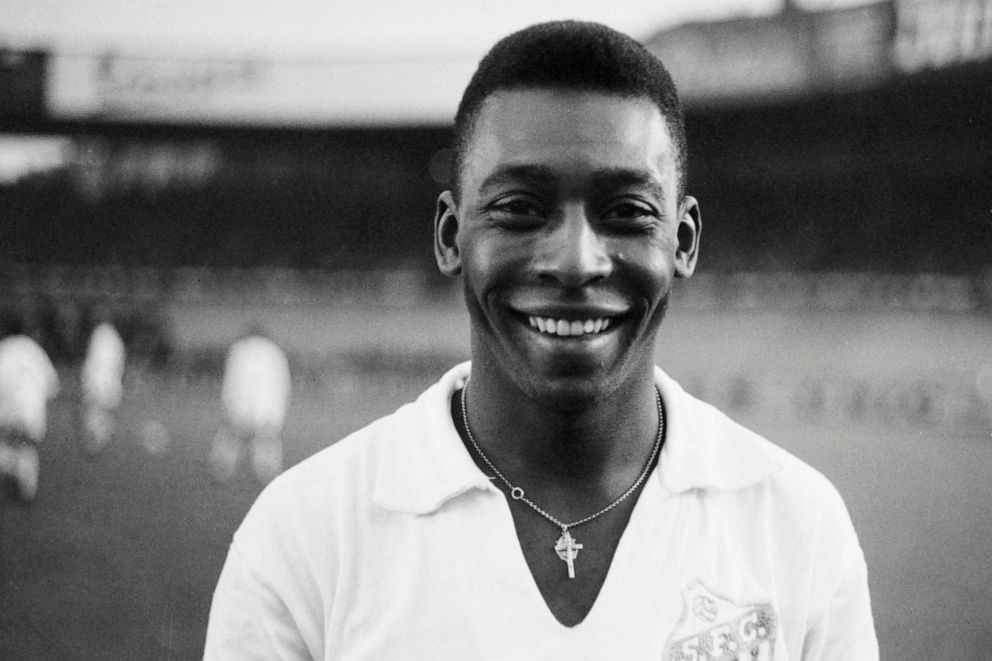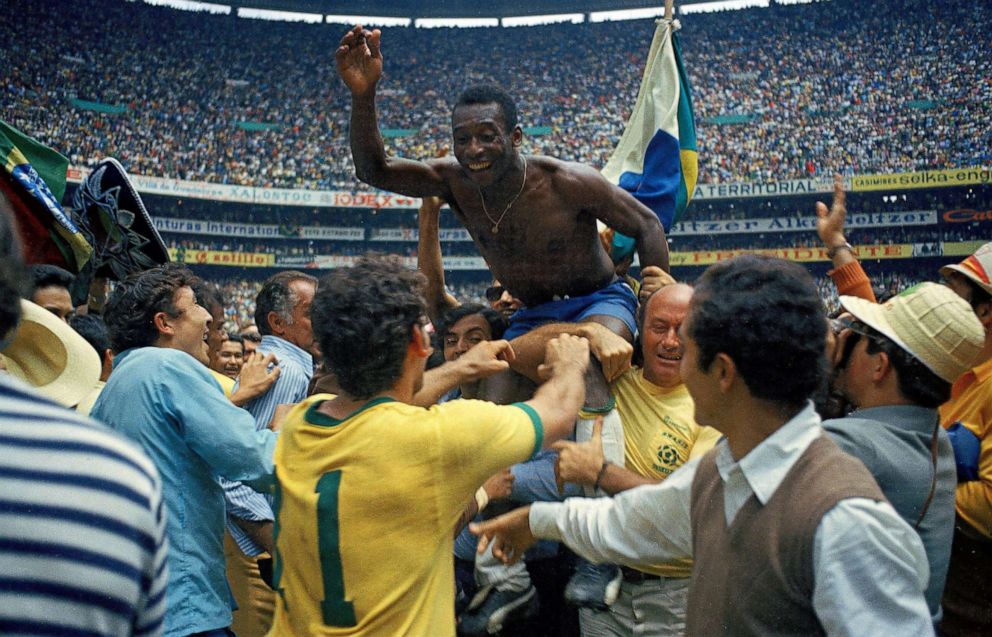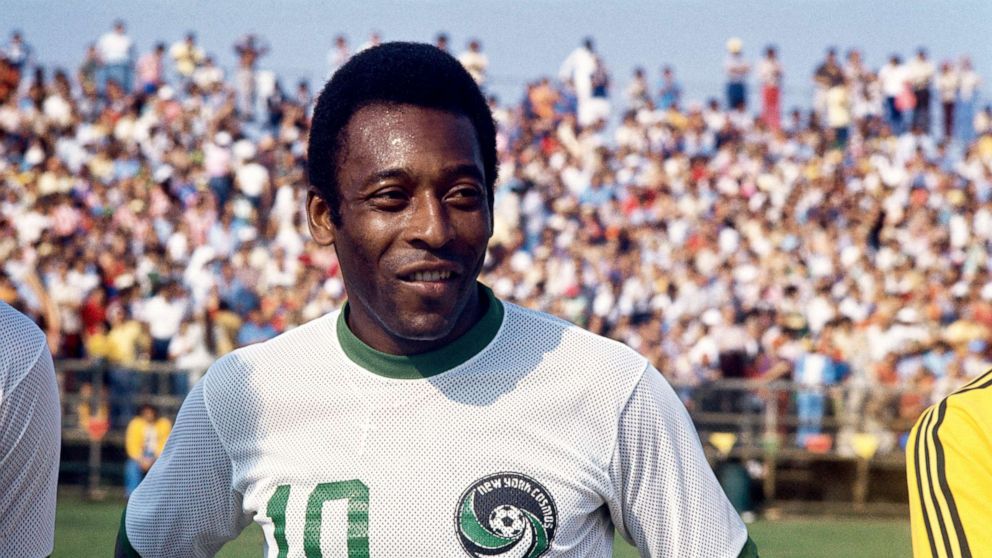Brazilian soccer legend Pelé dead at 82
Brazilian soccer legend Pelé, a three-time World Cup champion who's largely considered to be one of the best players ever, has died. He was 82 years old.
His daughter, Kely, confirmed his death on social media.
"All that we are is thanks to you," she wrote. "We love you forever. Rest in peace."
Brazil has planned 48 hours of national mourning. Pelé, whose full name was Edson Arantes do Nascimento, is expected to be buried in Santos, southeast of Sao Paulo, where he played for the city's club from 1956 to 1974.
The club said in a statement the public will be able to pay their final respects at Vila Belmiro Stadium, according to the Associated Press.
Santos said the coffin carrying the star will leave Albert Einstein hospital in Sao Paulo early Monday morning and will be placed in the center circle of the field. Visitation will start Monday at 10 a.m. and finish the next morning, the AP reported. A private funeral will follow attended by his family.
Pelé had been in and out of the hospital over the past year as he fought colon cancer. In November, Albert Einstein Hospital announced that his cancer had advanced and that he was in palliative care.
The hospital confirmed Pelé died at 3:27 p.m. local time from multiple organ failure as a result of colon cancer.

The soccer star was hospitalized in December 2021 shortly after undergoing chemotherapy to treat a reported colon tumor. He had posted on Instagram that he was recovering.
Over the past year, Pelé had dismissed fears over his health and continued to thank fans for their support.
"Dear friends, it's been a while since we talked about this. I want to let you know that I'm fine. I feel better every day. I don't think even the mask for my protection can hide my happiness. Thank you very much to all of you who send me good energy daily," he wrote in a November 2021 post on Instagram.
Named FIFA co-Player of the Century in 1999 along with Diego Maradona of Argentina, Pelé spent his retirement as a global ambassador for the sport and devoted to other humanitarian causes. In 2020, when Maradona died, Pelé remarked, "One day, I hope we can play football together in the sky."
"Pelé had a magnetic presence and, when you were with him, the rest of the world stopped," Gianni Infantino, the president of FIFA, said in a statement Thursday. "His life is about more than football. He changed perceptions for the better in Brazil, in South America and across the world."
Pelé was born on Oct. 23, 1940, in the town of Tres Coracoes in the southern Brazilian state of Minas Gerais. His parents named him after U.S. inventor Thomas Edison. Pelé's father, João Ramos do Nascimento, nicknamed Dondinho, was also a professional soccer player.
The young Edson received the nickname Pelé in school when schoolmates mocked his pronunciation of the popular Brazilian goalkeeper Bilé, he explained in a 2016 column for The Players' Tribune.
He began playing at 13 with a youth team in Bauru. He was scouted by Santos at 15 and began playing professionally with the team.

At just 17, he emerged as a superstar with his performance during Brazil's victorious 1958 World Cup, and he played his entire career in Brazil with Santos. He scored an astounding 618 goals in 636 games with Santos and won six Brazilian league titles.
Pelé won two additional World Cup titles -- in 1962 and 1970. He is the only player to win three World Cups and one of only two players -- alongside teammate Vava -- to score in two World Cup finals for winning sides.
He scored 77 goals in 92 international appearances. Brazilian forward Neymar tied his national record during the 2022 World Cup, just weeks before Pelé's death, by tallying his 77th goal in a match against Croatia.
"I would say before Pelé, football was just a sport. Pelé has changed it all," Neymar wrote on social media. "He turned football into art, into entertainment. Gave voice to the poor, blacks and mostly gave visibility to Brazil...He's gone, but his magic remains."
He ended his storied career with the New York Cosmos in 1977, generating a previously unmatched buzz for soccer in the U.S. The club, bankrolled by pioneering TV executive Steven Ross, brought in stars like Pelé, Italian striker Giorgio Chinaglia and German defender Franz Beckenbauer. The Cosmos was the only club besides Santos that Pelé ever played for.
His last game on Oct. 1, 1977, an exhibition game between the Cosmos and Santos, was played before a sellout crowd at Giants Stadium. The game was televised on ABC's "Wide World of Sports." Pelé played one half for each team.
"Pelé’s name will forever be synonymous with sporting artistry and genius," the Cosmos said in a statement. "His lasting impact on the sport of soccer is inestimable. Rest in peace, O Rei."
He later starred in John Huston's 1981 World War II sports film "Escape to Victory" alongside Sylvester Stallone and Michael Caine.
A biopic about his life, "Pele: Birth of a Legend," was released in 2016.
"A mere 'goodbye' to the eternal King Pelé will never be enough to express the pain that the entire football world is currently embracing," Portugal's Cristiano Ronaldo, the only man to score in more World Cups than Pelé, wrote. "An inspiration to so many millions, a reference yesterday, today and forever. The love you always showed me was reciprocated in every moment we shared even from distance. He will never be forgotten and his memory will live forever in each and every one of us football lovers."
Pelé is largely credited for sparking interest in the game in the United States during the 1970s, a legacy that lives on to this day.
"For a sport that brings the world together like no other, Pelé’s rise from humble beginnings to soccer legend is a story of what is possible," President Joe Biden tweeted Thursday. "Today, Jill and I's thoughts are with his family and all those who loved him."
He is survived by wife Marcia Aoki, as well as seven children: Brazilian soccer coach and former player Edson Cholbi do Nascimento, better known as Edinho; daughter Sandra Regina Machado Arantes do Nascimento; soccer player Joshua Nascimento; son Celeste Arantes do Nascimento; and three other daughters, Kely Cristina Nascimento, Flávia Christina Kurtz Nascimento and Jennifer Nascimento.




